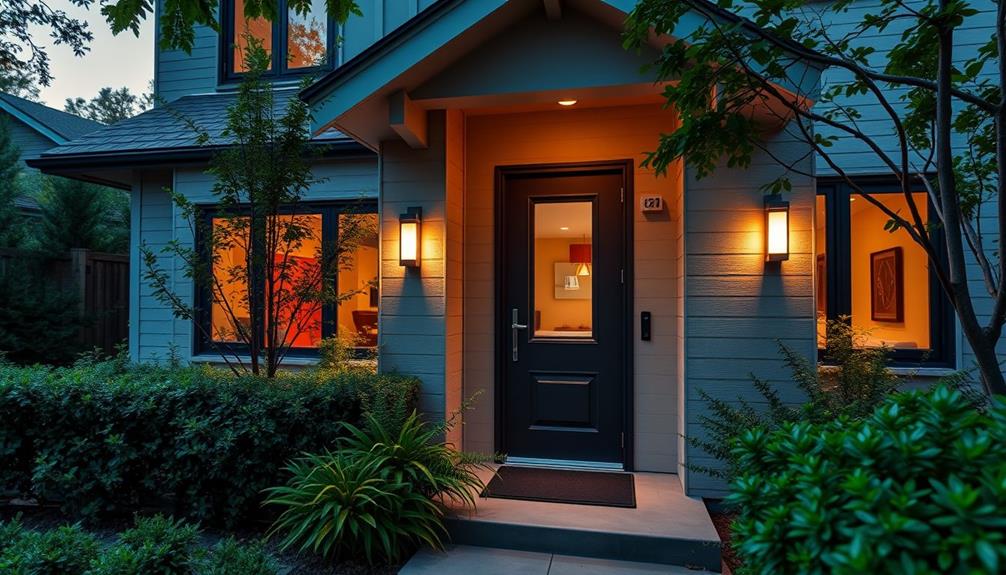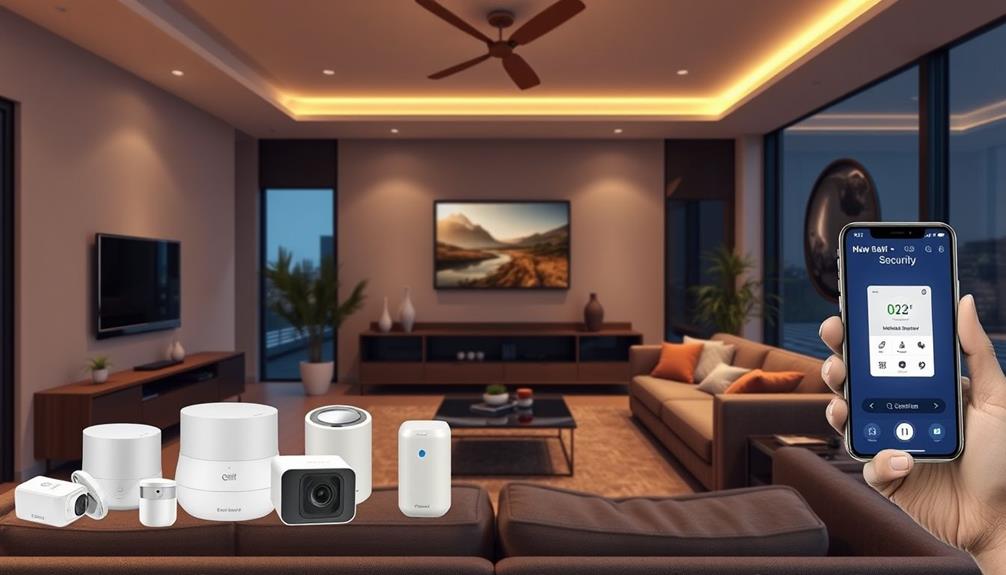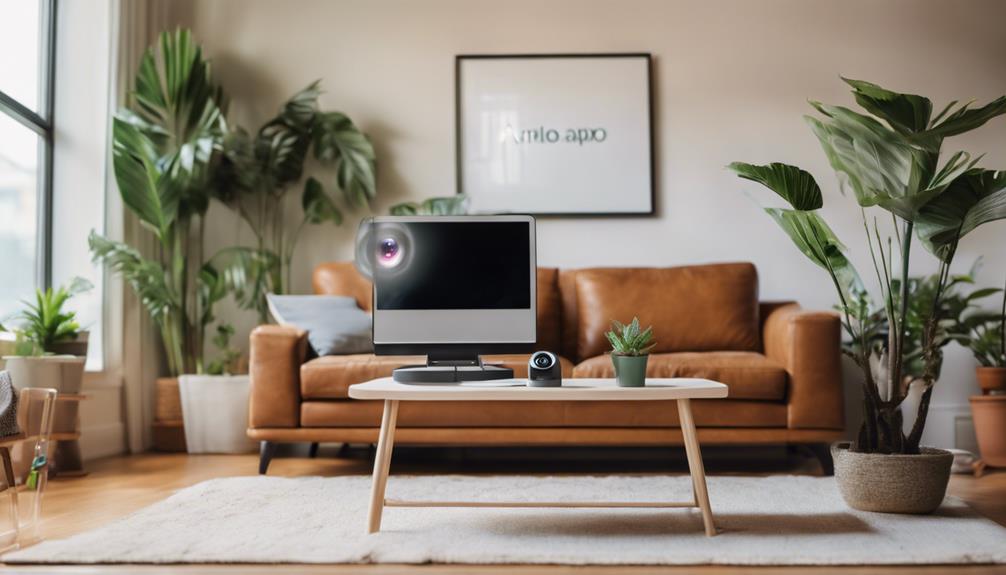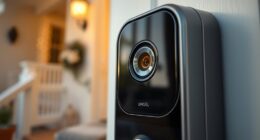A home security system should last around 10 years with proper maintenance, but some components like cameras may need replacing sooner due to technological advancements. If your system is over 15 years old, you'll likely face reliability issues and should consider updates. Regular maintenance and evaluations help identify problems and extend your system's lifespan. Watch for signs like frequent false alarms or damaged wiring, which indicate it's time to assess your system. Staying informed about the latest technologies can enhance your home security. To discover more about ensuring your system stays effective, it's worth exploring further details.
Key Takeaways
- The average lifespan of home security systems is approximately 10 years, with some components requiring upgrades sooner.
- Systems over 15 years old are considered outdated and may be unreliable.
- Wired systems can last 50-70 years with proper installation, but updates are still necessary for cameras and software.
- Regular maintenance and evaluations can extend the lifespan and effectiveness of security systems.
Understanding System Lifespan
Understanding the lifespan of your home security system is vital, as most systems last around 10 years before they start to show signs of wear or obsolescence. If you're relying on an existing security system that's nearing this age, you might be exposing yourself to potential vulnerabilities.
Components like cameras and software have shorter lifespans, meaning they can become outdated even sooner. As your system ages, you might find that it doesn't activate correctly, which could lead to increased risks of security breaches.
Regular evaluations of your home security systems are important; they allow you to identify when it's time to upgrade before significant failures occur. Moreover, older systems often come with higher repair costs due to obsolete technology.
It's not just about replacing broken parts; it's about ensuring you have a reliable, up-to-date system that meets today's security standards. Keeping an eye on the condition and performance of your existing security system will help you maintain a safe environment for you and your loved ones.
Don't wait until it's too late—start reviewing your home security system today.
Factors Affecting Longevity

When considering how long your home security system will last, both its age and the maintenance you provide play essential roles.
Regular upgrades and inspections can greatly extend its lifespan, preventing potential vulnerabilities.
Additionally, investing in a reputable home cleaning service can help maintain a tidy environment, which may also benefit the longevity of your security equipment.
Staying proactive about these factors guarantees your system remains effective and reliable.
System Age Considerations
The age of your home security system greatly influences its reliability and effectiveness, with various factors determining how long it can serve you well.
Generally, a typical system lasts about 10 years before components start to fail or become outdated. If your system is over 15 years old, it's likely considered outdated and mightn't provide reliable protection due to degraded components.
Wired systems have a longer lifespan, potentially lasting 50-70 years if installed correctly, but cameras and software generally require more frequent updates and have shorter lifespans.
Regularly evaluating your system can help identify when upgrades are necessary, ensuring that your security needs are met without significant vulnerabilities.
With technology continuously advancing, even well-maintained systems might need replacing or upgrading every 5-10 years to incorporate new features and improvements.
By staying aware of your system's age and capabilities, you can make informed decisions about when to invest in replacements or enhancements, ultimately ensuring your home remains secure.
Regular assessments of your system is key to maintaining the protection you rely on.
Maintenance and Upgrades
Regular maintenance and timely upgrades are essential for maximizing the longevity and effectiveness of your home security system. By conducting routine evaluations, you can identify issues like loose wiring or damage before they escalate, which can prolong the life of your system.
Generally, the average lifespan of a wired security system is around 10 years, but many components, such as cameras and software, can become outdated much sooner. To guarantee your system remains reliable, you should plan to upgrade an existing setup every 5 to 10 years. This not only incorporates advancements in technology but also enhances security features, keeping you protected against potential vulnerabilities.
If your system is aging—over 10 to 15 years—it's more prone to malfunctions, meaning you should prioritize maintenance to address any degrading components. Staying proactive with maintenance and upgrades prevents significant failures, ensuring your system operates at peak performance.
Signs Your System Needs Updating

If your home security system is over 10-15 years old, it's probably time to think about an upgrade.
You might also notice malfunctioning components or find that your system doesn't keep up with the latest technology advancements.
Recognizing these signs can help you guarantee your home stays secure and protected.
Age of System
Home security systems generally start showing signs of aging after about a decade, making it essential to evaluate their performance and reliability.
If your home alarm system is over ten years old, it's likely outdated. This age can mean it lacks modern features that newer models offer, such as enhanced connectivity and improved sensors.
You might notice that your system isn't functioning as effectively as it used to. Frequent false alarms or delays in activation can indicate that components are wearing out. These issues not only compromise your home's security but can also lead to higher repair costs over time.
Consulting with a security company is vital if your system is nearing the fifteen-year mark. They can assess your system's condition and help determine whether an upgrade is necessary.
Remember, investing in a more reliable home alarm system can greatly enhance your safety and peace of mind.
Don't wait until a security breach occurs to take action; proactive evaluations can save you time and stress in the long run.
Malfunctioning Components
As your system ages, malfunctioning components can become a serious issue, leading to unreliable performance and increased vulnerability to break-ins.
If you notice frequent false alarms, it might indicate outdated sensors or malfunctioning hardware, signaling the need for an upgrade or replacement of your security system. Poor performance in alarm activation or delayed notifications can also point to aging technology that may not function correctly, necessitating an assessment for potential upgrades.
Additionally, visible signs of wear, such as damaged wiring or corroded components, suggest that your system's reliability is compromised and should be evaluated for replacement.
If you find that your security system has been consistently requiring repairs or maintenance beyond normal wear and tear, it's a strong indicator that an upgrade may be vital for effective security.
Ignoring these signs can leave you vulnerable, so it's important to address any malfunctioning components promptly. By staying proactive about your system's health, you can guarantee your home remains secure and protected.
Technology Advancements
Technology advancements continually reshape the landscape of home security, making it essential to recognize when your system needs an update. If your security system is over 10-15 years old, it's likely outdated and may lack compatibility with newer technology. This can lead to security vulnerabilities that put your home at risk.
Here are some signs that it's time to evaluate an upgrade:
- Incompatibility with smart devices: If your system doesn't integrate with smartphones or other smart home devices, you're missing out on valuable features.
- Frequent malfunctions: If you notice your security system is malfunctioning regularly, it's a clear indicator that its components may be degrading.
Regularly reviewing your security systems can help you identify these issues. Staying informed about technology advancements allows you to maintain ideal protection for your home and loved ones.
Technological Advancements

With rapid advancements in technology, modern home security systems are evolving to offer features that enhance safety and convenience like never before.
Today's systems often include security cameras that provide high-definition video feeds, enabling you to monitor your home from anywhere through smartphone apps. This level of remote monitoring was unheard of in older systems, making it a game-changer for homeowners.
Additionally, new user interfaces allow for various activation methods, including biometric options like fingerprint scans, which are far more convenient than traditional keypads. You can even integrate your security system with your smart home devices, allowing seamless communication and control over your entire home environment. Imagine controlling your lights, locks, and security cameras all from a single app.
Regular software updates and upgrades keep your security system in tune with the latest innovations, ensuring you benefit from improved features and enhanced security.
As technology progresses, it's essential to stay informed and consider how these advancements can strengthen your home's safety. Investing in a modern security system now can greatly enhance your peace of mind while keeping your home secure for years to come.
Importance of Regular Maintenance

Regular maintenance is essential for ensuring your home security system operates efficiently and lasts longer. By regularly checking your alarm systems, you can catch issues early, preventing them from turning into costly repairs. A routine inspection can also keep your surveillance cameras clean and functioning at their best, as dirt can obstruct their performance.
Here are a few key reasons why maintenance matters:
- Prolongs lifespan: Regular checks help identify loose wires or damage, extending the life of your alarm systems.
- Enhances reliability: Early detection of problems means you can address them before they escalate, making your system more dependable.
Maintaining records from previous owners can also help you stay on top of necessary updates, as systems without documentation may need more frequent care.
Evaluating Your Security Needs

Evaluating your security needs is vital, especially as your lifestyle and circumstances change over time. Regularly reassess your situation to identify any new vulnerabilities that may arise from changes like work schedules or family dynamics. These shifts might require enhanced protection measures to keep your home safe.
Take a close look at the age and functionality of your current security system. Most systems last about ten years, and if yours is older, it might need an upgrade to guarantee reliable performance. Check for potential weaknesses, such as poor wiring or damaged hardware, which can compromise your system's effectiveness.
Consider the specific features you need. Depending on the size and layout of your property, you may require entry sensors, cameras, or additional alarms for thorough coverage. Tailoring your security system to your unique needs is essential for peak protection.
While you can assess your needs on your own, don't overlook the value of professional assessments. They can provide tailored recommendations to address your specific security challenges and future needs, making sure that your home remains secure.
Professional Assessment Benefits

A professional assessment can uncover hidden vulnerabilities in your security system, guaranteeing you're well-prepared for any potential threats. By evaluating your current system, experts can identify weaknesses that mightn't be obvious to you. This evaluation helps you make informed decisions about necessary upgrades or replacements.
Here are some key benefits of a professional assessment:
- Tailored Recommendations: Professionals consider your specific security needs and lifestyle changes, providing personalized advice to enhance your system.
- Latest Insights: Experts are well-versed in the newest technologies and features, helping you stay updated and improve the overall effectiveness of your security measures.
Investing in a professional assessment not only strengthens your current system but also guarantees you're equipped to face evolving security challenges. By taking advantage of these assessments, you can enhance your peace of mind, knowing your home is adequately protected.
Cost Considerations for Upgrades

Upgrading your home security system involves weighing various costs, from initial investments to ongoing fees, to guarantee you make the best choice for your budget and safety. The initial investment for an upgrade can range from $200 to $2,000, depending on the system's complexity and features. Don't forget to factor in professional installation, which can add $100 to $500 but often improves functionality.
Here's a quick overview of the cost considerations:
| Cost Type | Estimated Range |
|---|---|
| Initial Upgrade Cost | $200 – $2,000 |
| Professional Installation | $100 – $500 |
| Monthly Monitoring Fees | $15 – $60 |
Additionally, monthly monitoring fees typically range between $15 and $60, so keep an eye on those ongoing expenses. Investing in modern technology may also lead to savings on insurance premiums, as many insurers offer discounts for upgraded security measures. Finally, remember to budget for maintenance and repairs, averaging about $100 annually, to keep your upgraded system functioning at its best.
Planning for Future Security

Regularly evaluating your security system not only helps identify current needs but also prepares you for future enhancements and changes in your lifestyle.
As you consider planning for future security, think about how your home and its systems will need to adapt over time. Lifestyle changes—like starting a family or shifting work hours—can impact your security requirements.
Here are a few key points to keep in mind:
- Emerging Technologies: Stay informed about new security innovations that could enhance your home safety and integrate seamlessly with existing systems.
- Professional Insights: Engage with security specialists who can offer tailored recommendations based on your unique situation and evolving needs.
Frequently Asked Questions
How Long Does a Home Security System Last?
You'll find home security systems usually last around 10 to 15 years. However, regular maintenance and upgrades can extend their effectiveness, ensuring they adapt to new technology and reduce the risk of malfunctions or false alarms. It’s important to assess your system periodically, replacing outdated components or adding new features as needed to keep up with evolving security threats. Factors such as environmental conditions, usage patterns, and technological advancements also play a role in how long home security systems last. Ultimately, staying proactive can ensure your system remains reliable well beyond its typical lifespan.
What Is the Lifespan of a Burglar Alarm?
Think of a burglar alarm as a loyal sentinel, typically lasting about 10 years. However, components like sensors often fade away sooner, needing replacement to keep your home safe and secure against ever-evolving threats.
What Happens When a Home Security System Goes Off?
When your home security system goes off, it triggers an alarm, alerts you via notifications, and may contact monitoring services. You should verify the situation and decide whether to contact authorities or not.
Are Wired Security Systems Obsolete?
When it comes to wired security systems, they're starting to feel like yesterday's news. While still functional, you'll find modern wireless options offer better integration and security. Evaluating your system regularly can keep you protected.
Conclusion
To summarize, your home security system is like a sturdy shield; it should evolve as threats change and technology advances.
Regular maintenance and evaluations will guarantee it stands strong against potential breaches.
Don't hesitate to upgrade when necessary, as peace of mind is invaluable.
By staying proactive and attentive to your security needs, you can safeguard your home effectively and enjoy the comfort of knowing you've taken the right steps to protect what matters most.









